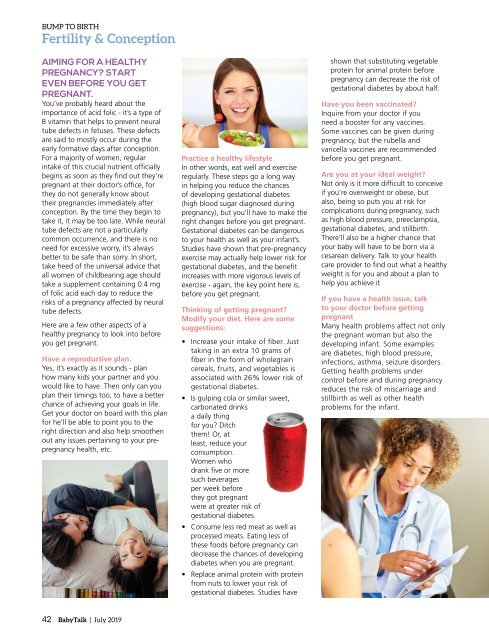Create successful ePaper yourself
Turn your PDF publications into a flip-book with our unique Google optimized e-Paper software.
Bump to Birth<br />
Fertility & Conception<br />
Aiming for a healthy<br />
pregnancy? Start<br />
even before you get<br />
pregnant.<br />
You’ve probably heard about the<br />
importance of acid folic - it’s a type of<br />
B vitamin that helps to prevent neural<br />
tube defects in fetuses. These defects<br />
are said to mostly occur during the<br />
early formative days after conception.<br />
For a majority of women, regular<br />
intake of this crucial nutrient officially<br />
begins as soon as they find out they’re<br />
pregnant at their doctor’s office, for<br />
they do not generally know about<br />
their pregnancies immediately after<br />
conception. By the time they begin to<br />
take it, it may be too late. While neural<br />
tube defects are not a particularly<br />
common occurrence, and there is no<br />
need for excessive worry, it’s always<br />
better to be safe than sorry. In short,<br />
take heed of the universal advice that<br />
all women of childbearing age should<br />
take a supplement containing 0.4 mg<br />
of folic acid each day to reduce the<br />
risks of a pregnancy affected by neural<br />
tube defects.<br />
Here are a few other aspects of a<br />
healthy pregnancy to look into before<br />
you get pregnant.<br />
Have a reproductive plan.<br />
Yes, it’s exactly as it sounds - plan<br />
how many kids your partner and you<br />
would like to have. Then only can you<br />
plan their timings too, to have a better<br />
chance of achieving your goals in life.<br />
Get your doctor on board with this plan<br />
for he’ll be able to point you to the<br />
right direction and also help smoothen<br />
out any issues pertaining to your prepregnancy<br />
health, etc.<br />
Practice a healthy lifestyle<br />
In other words, eat well and exercise<br />
regularly. These steps go a long way<br />
in helping you reduce the chances<br />
of developing gestational diabetes<br />
(high blood sugar diagnosed during<br />
pregnancy), but you’ll have to make the<br />
right changes before you get pregnant.<br />
Gestational diabetes can be dangerous<br />
to your health as well as your infant’s.<br />
Studies have shown that pre-pregnancy<br />
exercise may actually help lower risk for<br />
gestational diabetes, and the benefit<br />
increases with more vigorous levels of<br />
exercise - again, the key point here is,<br />
before you get pregnant.<br />
Thinking of getting pregnant?<br />
Modify your diet. Here are some<br />
suggestions:<br />
• Increase your intake of fiber. Just<br />
taking in an extra 10 grams of<br />
fiber in the form of wholegrain<br />
cereals, fruits, and vegetables is<br />
associated with 26% lower risk of<br />
gestational diabetes.<br />
• Is gulping cola or similar sweet,<br />
carbonated drinks<br />
a daily thing<br />
for you? Ditch<br />
them! Or, at<br />
least, reduce your<br />
consumption.<br />
Women who<br />
drank five or more<br />
such beverages<br />
per week before<br />
they got pregnant<br />
were at greater risk of<br />
gestational diabetes.<br />
• Consume less red meat as well as<br />
processed meats. Eating less of<br />
these foods before pregnancy can<br />
decrease the chances of developing<br />
diabetes when you are pregnant.<br />
• Replace animal protein with protein<br />
from nuts to lower your risk of<br />
gestational diabetes. Studies have<br />
shown that substituting vegetable<br />
protein for animal protein before<br />
pregnancy can decrease the risk of<br />
gestational diabetes by about half.<br />
Have you been vaccinated?<br />
Inquire from your doctor if you<br />
need a booster for any vaccines.<br />
Some vaccines can be given during<br />
pregnancy, but the rubella and<br />
varicella vaccines are recommended<br />
before you get pregnant.<br />
Are you at your ideal weight?<br />
Not only is it more difficult to conceive<br />
if you’re overweight or obese, but<br />
also, being so puts you at risk for<br />
complications during pregnancy, such<br />
as high blood pressure, preeclampsia,<br />
gestational diabetes, and stillbirth.<br />
There’ll also be a higher chance that<br />
your baby will have to be born via a<br />
cesarean delivery. Talk to your health<br />
care provider to find out what a healthy<br />
weight is for you and about a plan to<br />
help you achieve it<br />
If you have a health issue, talk<br />
to your doctor before getting<br />
pregnant<br />
Many health problems affect not only<br />
the pregnant woman but also the<br />
developing infant. Some examples<br />
are diabetes, high blood pressure,<br />
infections, asthma, seizure disorders.<br />
Getting health problems under<br />
control before and during pregnancy<br />
reduces the risk of miscarriage and<br />
stillbirth as well as other health<br />
problems for the infant.<br />
42 BabyTalk | <strong>July</strong> <strong>2019</strong>

















